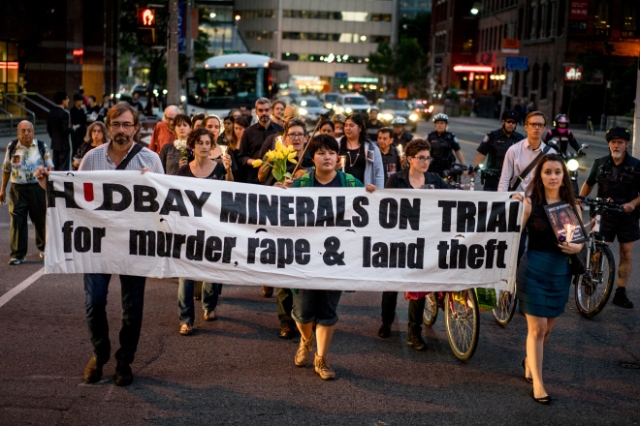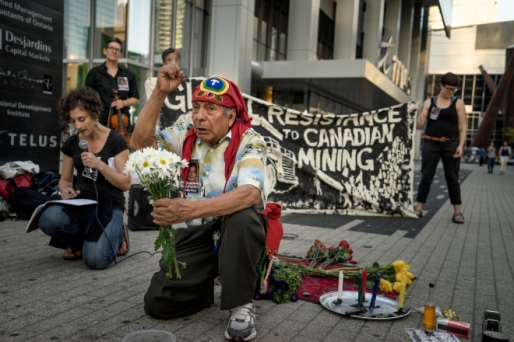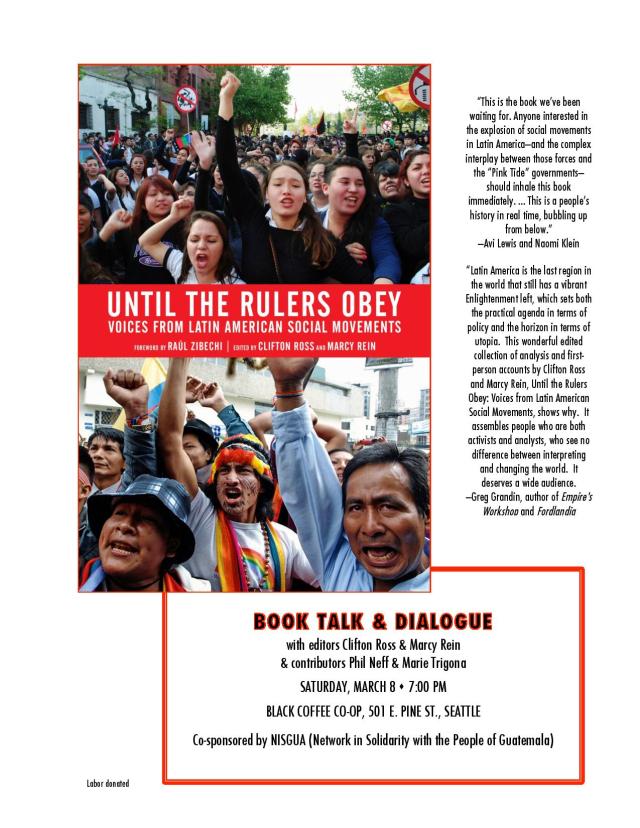
It has been a busy and disturbing couple of weeks in Guatemala, with a series of high-impact incidents of violence and developments in key legal cases of justice for human rights violations. GuateSec has collected relevant reports and offers preliminary analysis on these topics below. Follow @cascadiasolid on Twitter for updates.
Genocide trials moved up
Following Judge Miguel Angel Galvez’s widely-reported decision to try of former dictator Efraín Ríos Montt and his intelligence chief Rodriguez Sánchez for genocide and crimes against humanity, presiding Judge Yazmin Barrios announced that public oral arguments in the trial will commence March 19, rather than in August as originally scheduled. The accelerated timeline will limit defense lawyers’ continued attempts to delay the trial through repetitive injunctions; most recently, the Generals unsuccessfully argued that the judges overseeing the process should be recused due to their previous role in obtaining convictions for the Dos Erres massacre. The genocide trial is likely to last several weeks, with the prosecution alone offering more than 900 pieces of evidence, including survivor testimony and reports by expert witnesses.
Totonicapán massacre case collapses
In less heartening legal news, prosecutors failed to secure charges of extrajudicial execution against 9 soldiers accused of the October 4, 2012 shooting of 6 K’iche Maya protesters and wounding of at least 14. Instead, Judge Carol Patricia Flores charged the soldiers with homicide (and attempted homicide) in a state of violent emotion, carrying a possible sentence of 2 to 8 years prison, compared to 25-30 years or extrajudicial execution. Commanding officer Juan Chiroy Sal was charged with breach of duty, with a possible 1 to 3 year sentence. Crucially, these charges do not implicate the state or military in the Totonicapán massacre, which would limit the possibility of reparations for survivors and families of the victims. The judge and courtroom observers criticized an incomplete investigation and shoddy presentation of evidence by public prosecutor Aida Granillo, including “cut-and-paste” accusations and failure to account for bullet casings which did not correspond to the weapons used by the soldiers. Lawyers for the victims announced plans to appeal the ruling, as well as the potential for future civil and international suits.
Impunity assassination could widen institutional fissures
On the evening of February 14, criminal lawyer Lea de Leon and her driver were machine-gunned to death by unknown assailants. De Leon was involved in multiple high-profile cases, including acting as defense lawyer for the Paiz brothers, accused of hiring the assassins in the 2009 Rosenberg affair; as well as Maria Melgar, accused in the murder of former Interior Minister Victor Rivera. Though de Leon’s murder is under investigation and its motive has yet to be clarified, the case bears all the hallmarks of a killing intended to preserve impunity—though for whom is unclear. Most troubling, de Leon’s husband, Prensa Libre newspaper editor Edin Hernandez, suggested at the scene of the crime that the lawyer had been threatened by Rony Lopez, a public prosecutor involved the Valat financial fraud case which she was litigating. These allegations could provoke serious instability within the justice and security institutions. Attorney General Claudia Paz and MP representatives denied having received reports of threats, and were aware only of “procedural differences” between the lawyer and prosecutor. Lopez also denied the allegations.
VIP prisoner’s privileges cause shakeup
Captain Byron Lima Oliva was caught red-handed on February 15th as he returned from a trip outside the walls of Pavoncito prison in a caravan of two bulletproofed SUVs. The military intelligence officer is the only conspirator remaining imprisoned for the 1998 murder of human rights advocate Bishop Juan Gerardi; his father, Colonel Byron Lima, and priest Mario Orantes were both released on good conduct during the last year. According to Interior Minister López Bonilla, Captain Lima and other prisoners enjoy regular improperly-authorized leaves from prison as a result of corruption and lax controls. Lima argued that his leaves were authorized for urgent medical operations, though his drivers admitted that the Captain left the prison several times a week, and two unregistered weapons were found in the detained vehicles.
As a result of Captain Lima’s arrest, prison system director Luis Alberto Gonzalez and the director of Pavoncito prison were both removed from their posts. Gonzalez, a fellow military officer, had previously described Lima as a “model prisoner” responsible for directing rehabilitation efforts, a charitable description of Lima’s widely-denounced role as a prison strongman. Although a judge dismissed charges of evasion against Lima, it was announced that he would be transferred to a different prison. Edy Fisher, another military special forces officer, who also signed off on Lima’s sojourns, was named as director of penitentiaries.
It remains unclear whether Lima was the target of a specific investigation, though investigative journalist and rumor-monger José Ruben Zamora suggests in El Periodico’s El Peladero column that the spectacle of Lima’s arrest served to divert attention from the murder of lawyer Lea de Leon, as well as reporting that imprisoned narco bosses have put out contracts on Lima in retaliation for his attempts to raise payments for his henchmen’s security services within the jails. The Lima case is also being used as a pawn in the ongoing political war between the governing Patriot Party and opposition party LIDER, which has seized on allegations that the SUVs used to ferry Lima belong to a Patriot Party congressman, and has asked the UN Commission Against Impunity to investigate. Whatever the background machinations, it seems that Lima’s stock is falling—at least in terms of perception.
https://twitter.com/hunahpuEixbalan/status/306205607956996097
MinGob jumps at shadows
In an episode that made the international press, Interior Minister Lopez Bonilla announced the possible death of Sinaloa cartel boss “El Chapo” Guzmán in a shootout between rival trafficking caravans in the Petén. After this bombshell had provoked a media frenzy, the Minister was forced to report that security forces could not even reliably confirm that the rumored confrontation had occurred, much less that El Chapo himself, or anyone resembling him, had been killed in Petén. In addition to potentially provoking instability in the cartel ecosystem, the incident is embarrassing for Guatemala’s security institutions on at least two fronts, revealing a lack of territorial control and accurate intelligence, as well as a serious lack of judgment in publicly acknowledging explosive, unconfirmed rumors.
https://twitter.com/BlogNarco/status/306550480383909888
(Even the fake Chapo got in on the fun…)
https://twitter.com/_ElChapoGuzman_/status/304847828516229120
Motorcyclist’s death leads to calls for social cleansing
The gruesome death of an alleged thief on February 20th in Guatemala City prompted expressions of both approval and rejection of armed vigilantism and “social cleansing” violence. Though details remain under investigation, the narrative which circulated first via social media and later in the press told of an armed thief aboard a motorcycle who burned to death when another motorist—reportedly either the victim of theft of a wallet or another driver who witnessed the assault—fired and ignited the motorcyclist’s gas tank. The victim was identified as 28-year-old Edgar Giovanni Cifuentes Pérez, described as a gardener by family members. Photos of the crime scene circulated on Twitter with the approving hashtag #MuerteALosMotoLadrones, which was attributed to a Twitter user reportedly associated with the popular broadcaster Radio Sonora. President Pérez Molina himself got in on the action, responding to the killing by saying “Let it serve as a lesson for criminals.” The incident shortly followed an attempted lynching just blocks from Guatemala City’s Central Park and National Palace on February 10th, in which two presumed muggers narrowly avoided death at the hands of a mob, which also attacked police attempting to intervene.
https://twitter.com/hunahpuEixbalan/status/306479421613801472

Popular Injustice by Angelina Snodgrass Godoy (Stanford University Press 2006) and Dispersing Power by Raúl Zibechi (AK Press 201
Academic and political analyses suggest that lack of trust in a failed state justice system and the rupture of community social fabric due to displacement, mass violence, and state terror are at the root of phenomena such as lynchings and other forms of non-state punitive measures against criminals—see Angelina Snodgrass Godoy’s Popular Injustice and Raúl Zibechi’s Dispersing Power for two incisive treatments of this topic. Though lynchings generate high-profile media coverage, cases resulting in death are relatively rare, with 13 in 2012 according to official statistics. “Social cleansing” killings, carried out clandestinely by state or para-state actors, are thought to have reached a peak of some 3,500 deaths during the administration of President Oscar Berger; several members of his administration continue to face charges internationally relating to the extrajudicial execution of prisoners. The iron-fisted “mano dura” security policy that Otto Pérez Molina promised to implement upon election is popularly associated with acts of social cleansing, as evidenced by the number of #MuerteALosMotoLadrones Tweets referencing mano dura.












